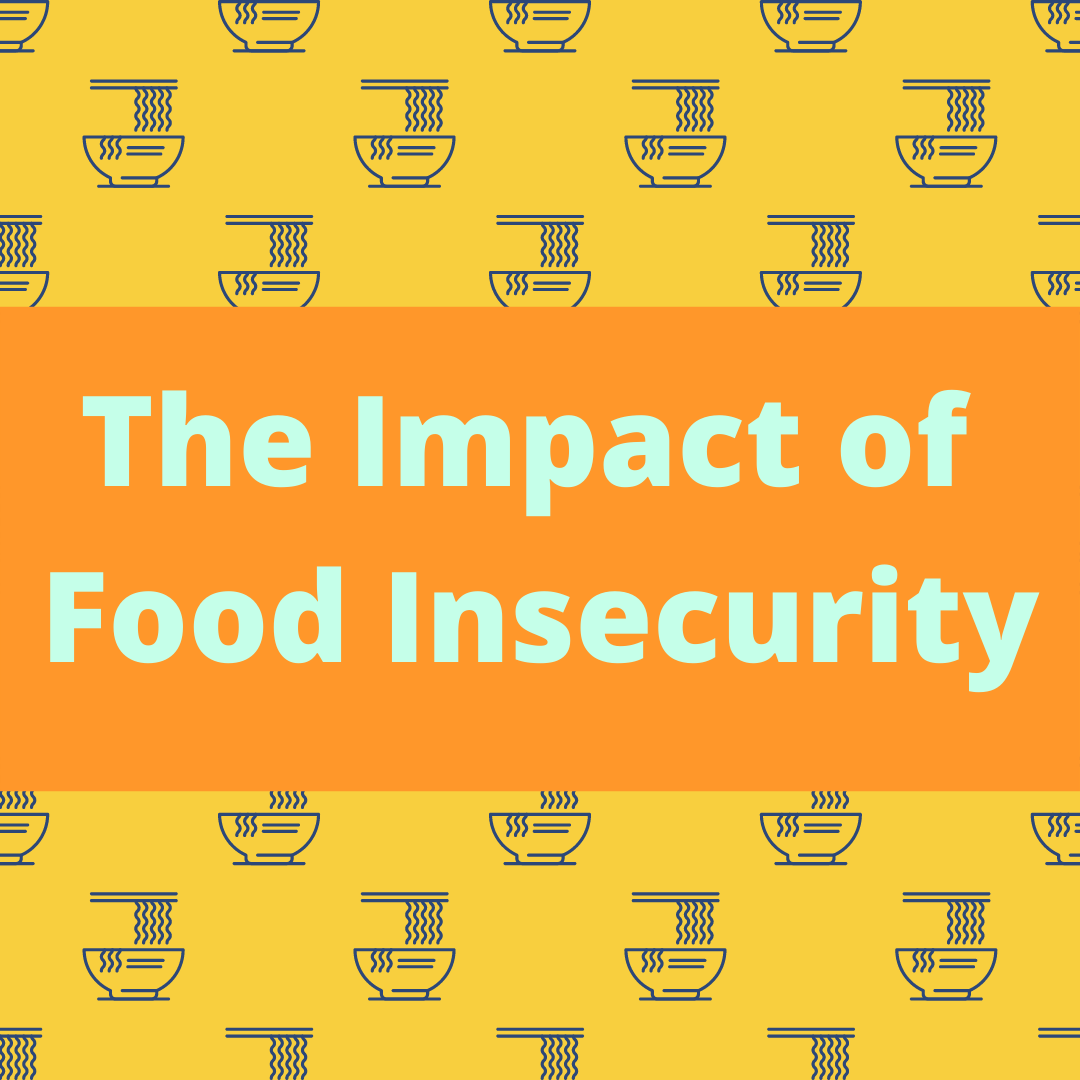The Impact of Food Insecurity
Try to imagine what it means living with food insecurity as you try to attend classes, study, and function in your day to day routines. Aside from the physical pangs of hunger, fatigue, dwindling energy and the inability to concentrate, that empty, growling feeling within your stomach, that’s just the tip of the iceberg.
College is typically a drastic upgrade in course materials and complexity coupled with a host of new responsibilities, including navigating independence and maintaining self-discipline, motivation and organization.
Not only does hunger hamper vital skills necessary to successfully manage coursework—focus, attention, clarity of thought, stamina—gnawing hunger has been associated with influencing self-control and decision-making, stress perception and stress response.
Moreover, hunger can contribute to deeper psycho-social effects on student well-being, frequently going unnoticed by others and creating additional emotional pain for the individual trying to make ends meet. Below are some of the themes identified in a smaller study conducted at UC Berkeley:
The Daily Stress of Food Insecurity
Continuous food insecurity imposes chronic anxiety about a student’s next meal and finances as well as heightens worry about the impact of these stressors on an individual’s academic performance.
Experiencing Resentment & Jealousy
In the face of more affluent peers, students may struggle with feelings of resentment and jealousy towards others who are able to focus on their classes and assignments without concerns for their next meal or ability to access resources.
Sadness for Multiple Reasons
Recognizing oneself as lacking basic resources or having to forego extracurricular activities and social meet-ups due to ongoing struggles can evoke feelings of sadness, leading to withdrawal and isolation.
The emotional toll may further extend to feelings of guilt and embarrassment for having to lie or cover up one’s circumstances and inability to secure basic needs.
Hopelessness, Frustration & Anger
Not surprisingly, many students feel their situation is hopeless. Trying to balance the need to work more hours while finding time to study threatens their confidence in successfully meeting course requirements, passing exams and securing a degree. On the other hand, the prospect of having to go into more debt to survive can be equally overwhelming.
Anger towards the larger institution can surface and result in feelings of abandonment for not providing adequate support and resources to ensure the success of their students.
Academics
Ultimately, the course of a student’s academic performance can quickly deteriorate, placing them at a higher risk for:
reduced ability to optimally participate and perform both inside and outside the classroom
experiencing academic difficulties
experiencing academic probation or remediation
changing their major or degree
dropping out
These are real consequences that keep many from realizing their potential.
Low-income and marginalized populations, already experiencing disproportionately higher rates of basic needs insecurities, frequently have to cope with additional factors, such as lack of access to the internet and reliable transportation, having to support their family, being a caregiver, and managing the household or younger siblings / children, or working multiple jobs.
Other risks identified among food-insecure young adults can be more ominous.
Food Insecurity Associated With Risk Behaviors
In a larger study of 14,786 young adults 14 percent of young women and 9 percent of young men were found to be food insecure. Within this population, food insecurity was associated with higher risk sexual behaviors, including transactional sex; increased rates of sexually transmitted infections, including HIV; and increased substance use.
Both young women and young men who identified as gay and bisexual were at highest risk not only for food insecurity, but exchanging sex for money. Needless to say for many young women, this increases the added risk of unintended pregnancy and single-parenthood.
Food Insecurity Associated With Chronic Disease, Reduced Mental Health & Well-Being
Long-term, food insecurity eventually catches up with an individual’s health, increasing their risk of heart disease, obesity, high blood pressure, diabetes, depression, and reduced mental health and well-being. It’s a lose-lose situation that requires intervention.
Romanticizing college hunger as a rite of passage has no merit.
Nor is it a badge of honor.
If anything, it’s a reflection of our values, our willingness (or lack thereof) to invest in education, and our ability (or inability) to see the bigger picture. It’s an unnecessary struggle imposed on those trying to learn, innovate, grow, get ahead, support themselves, and contribute to society with meaningful and satisfying careers.
It’s time to rethink our commitment to the next generation as well as reimagine the pathways to obtain profitable careers beyond merely attending college—one that should begin early and include a greater promotion of trade skills, apprenticeships, business and financial education, and exposure to the plethora of jobs that exist.
Education is vital to correcting so many social disparities and ensuring the strength and progress of our country. We must start thinking beyond ourselves.
Notes & References:
Meza, Anthony et al. “"It's a Feeling That One Is Not Worth Food": A Qualitative Study Exploring the Psychosocial Experience and Academic Consequences of Food Insecurity Among College Students.” Journal of the Academy of Nutrition and Dietetics Vol. 119,10 (2019): 1713-1721.e1.
Nagata, Jason M et al. “Food Insecurity, Sexual Risk, and Substance Use in Young Adults.” The Journal of Adolescent Health : Official Publication of the Society for Adolescent Medicine Vol. 68,1 (2021): 169-177. doi:10.1016/j.jadohealth.2020.05.038
Felter, Cara E et al. “Identifying and Addressing Social Determinants of Learning During the COVID-19 Pandemic.” Physical Therapy Vol. 101,11 (2021): pzab210. doi:10.1093/ptj/pzab210
Hanmer, Janel et al. “Association between Food Insecurity and Health-Related Quality of Life: A Nationally Representative Survey.” Journal of General Internal Medicine Vol. 36,6 (2021): 1638-1647. doi:10.1007/s11606-020-06492-9
